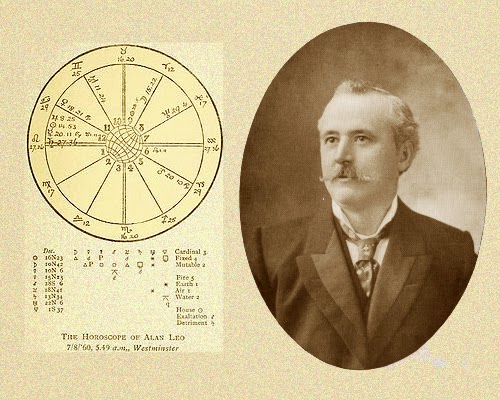Victorian astrologer Alan Leo (William Allan) had, famously, a natal stellium in Leo, including Saturn rising, closely conjunct his ascendant. He was in the forefront of the Theosophical movement in the early 20th Century and his prosecution for fortune telling in 1917 proved a landmark case for the practice of astrology. Leo ran a thriving mail order horoscope service, but became a victim of his own eminence when he was sued by a disgruntled client under The Vagrancy Act, an English statute of 1824 that effectively outlawed professional astrology[1].
Leo’s trial took place at the approach of his second Saturn return, specifically as Saturn entered his natal Twelfth house. In court, he made a good witness and escaped with only a nominal fine, even though under the Act, he could technically have been imprisoned with hard labour (yes). Jupiter in his natal Twelfth house seems to have spared him this fate. The upshot was that Leo decided to rewrite his extensive back catalogue of books and personal horoscopes, rephrasing his traditional predictive style in favour of a 'trends and tendencies' approach. This had apparently been his long-term intention in any case, but the lawsuit was a compelling motivation for him to expedite the work. So influential an astrologer was Leo that others followed his Theosophically-inclined direction and the impact of the Mansion House case has reverberated through astrology to the present day.
A possible reading of this affair is that Leo brought the lawsuit upon himself by a kind of unconscious intention. He did not wish to be prosecuted, of course, but as an example of Saturn’s transit of the Twelfth house, where latent fears and karma are played out in a quite distorted fashion, he became the instrument of a larger destiny. In the event, Alan Leo did not live to see the revision of his work completed, for he died within the year, as Saturn approached his natal Sun.
************************
Jyotish Chart: 7th August 1860, 5:47am, London UK.
There are very few famous astrologers in history, so anyone who has made a name for himself in the field is fairly sure to have a powerful chart. This is borne out in Leo's case, with Lagnesh Moon in parivartana yoga with exalted Jupiter in the first house, an outstanding, textbook Raja Yoga. This combination promises wealth, fame and protection through higher knowledge and publishing.
Noteworthy too is Yogakaraka Mars in the Sixth house of lawsuits, in a karma-dharma adhipathi yoga with Venus in the 12th house. The famous legal battles for which Leo is best known occurred in his Mars Mahadasha, which began in 1912. This was the height of astrology in Edwardian England, when the Metropolitan Police Commissioner issued an order that fortune tellers of all types within his jurisdiction must remove all words such as "palmist", "clairvoyant" and "astrologer" from their doorplates, window signs and other public advertisements. Public concern was heightened enough for questions to be asked in the House of Commons in 1911 and 1912. (Biography of Alan Leo, by Kim Farnell www.skyscript.co.uk)
Leo's first prosecutions for fortune telling came at Mansion House Magistrates Court February and April 1914, during his Jupiter antardasha. This protective influence may have been instrumental in the case against him being thrown out, though costs were awarded against him. His second trial in mid 1917 came during Venus antardasha, and was not so fortunate. Leo's counsel made unsuccessful attempts to engage in philosophical arguments vis-a-vis astrology, and their 'trends and tendencies' defence foundered on a statement from one of his almanacs:
At this time a death in your family circle is likely to cause you sorrow.
At this time a death in your family circle is likely to cause you sorrow.
This was an open goal for the prosecution: "Was this death a tendency, or was there a tendency to be dead?" Despite impressing the judge with his character, Leo was found guilty and fined £5 with £25 costs (about £2000 in today's money). The charges against him carried a possible custodial sentence with hard labour: Venus in the rasi 12th brings the threat of imprisonment, and Leo's friends believed the stress of the case was a contributor to his untimely death only a month later.
Many people today believe Alan Leo has a lot to answer for, and the impact of the Mansion House Case was a - negative - watershed for astrology. It is hopefully not too melodramatic to see that he acted as a kind of sacrificial channel for the future of astrology. If this is a fatalistic reading, the irony is that astrology became decisively less fatalistic as a result and maybe it is this new movement that was striving to get out.
[1] Anyone practicing fortune telling was defined as a ‘scoundrel and vagabond’ and repeat offences made them ‘an incorrigible vagabond’(!)


good article thanks for sharing the information Indian Astrologer Consultant in London | Best Indian Astrologer in UK
ReplyDelete
ReplyDeleteNice blog..! I really loved reading through this article... Thanks for sharing such an amazing post with us and keep blogging. Astrologer Consulting Service in London | Famous Astrology Consultation in London
love problem solution
ReplyDeletelove guru in delhi
husband and wife problems
husband wife problem solution
ReplyDeletelove problem solution in california
love problem solution in mumbai